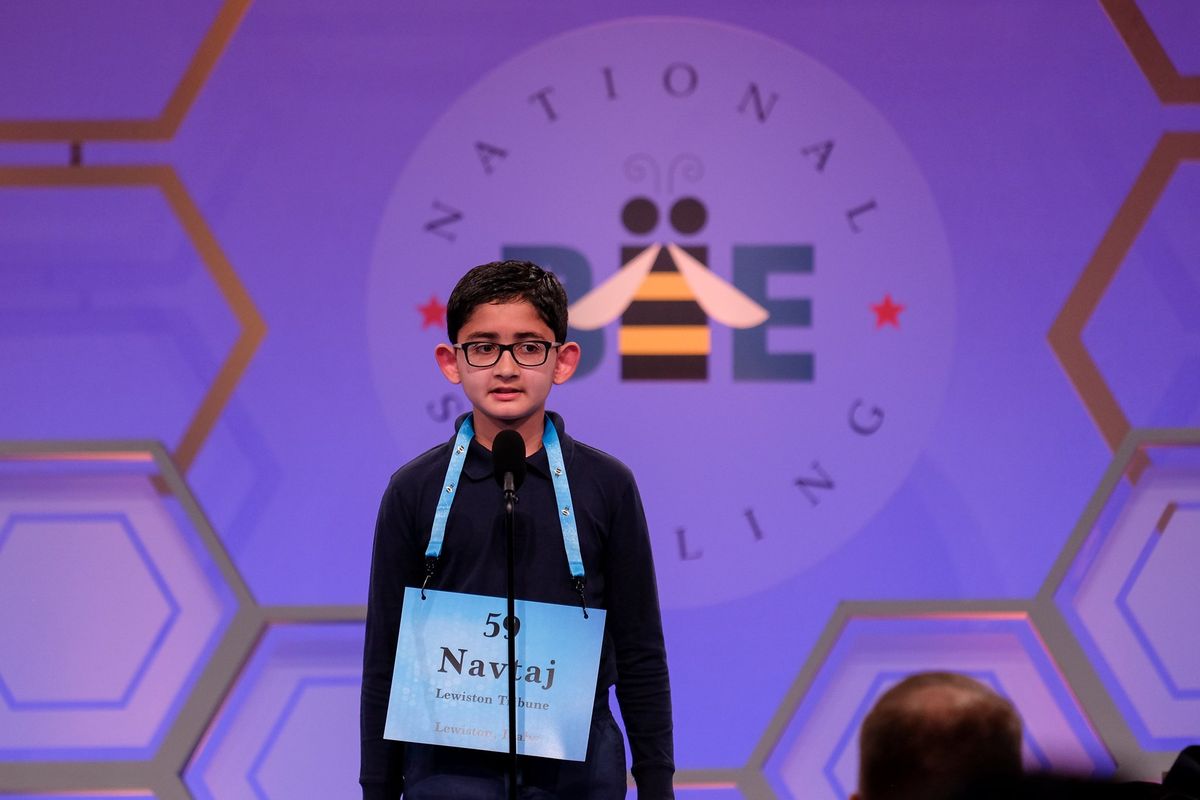Spelling champs from Pullman, Coeur d’Alene headed to National Spelling Bee

WASHINGTON, D.C. – Two champion spellers from the Inland Northwest are set to compete in the Scripps National Spelling Bee, which begins on Tuesday just outside the nation’s capital.
Navtaj Singh, of Pullman, 12, will return for a second year after he was one of only two fifth-graders to reach the semifinals in 2022. Kayla Tenney Villalobos, of Coeur d’Alene, 14, will be competing for the first time at the annual contest that takes place at National Harbor in Oxon Hill, Maryland.
Tenney Villalobos qualified for the national championships by winning the North Idaho Spelling Bee in Coeur d’Alene in February, the first time she had entered a spelling bee. She said she was looking forward to taking her first trip to D.C. and meeting the other 230 spellers who will compete over three days in the prestigious event’s 95th year.
“I’m excited for the entire thing,” she said. “I haven’t been on the East Coast of the United States at all. I’m super excited about the spelling bee itself and getting to meet other spellers and just meeting – I know this is probably going to sound funny – but other people who are very meticulous in spelling.”
In March, Singh won the Inland Northwest Regional Spelling Bee in Lewiston for the second consecutive year, making him one of 41 spellers returning from last year.
“I’m looking forward to seeing what I can do this year and seeing if I can improve,” he said. “And I’m also looking forward to meeting new people.”
The spellers competing in the national bee range from age 9 to 14, according to organizers. The winner will receive the Scripps Cup and a $50,000 cash prize, with smaller awards for the other finalists.
“Bee Week is a truly unforgettable experience, combining the thrill and accomplishment of onstage competition with the joy of making lifelong connections offstage,” Corrie Loeffler, executive director of the Scripps National Spelling Bee, said in a news release.
The competition has become increasingly intense in recent years, with many of the top spellers mastering strategies to spell even words they have never heard before and their parents of hiring coaches.
Past champions won with words that would make today’s contestants laugh, including “therapy” in 1940, “croissant” in 1970 and “luge” in 1984. Last year, Singh reached the semifinals by correctly spelling “toquilla,” a palm like plant from South America, before misspelling “pterygiophore,” which refers to the bones in a fish’s dorsal fin.
Singh said he has been training mostly on his own, using a flash-card app that shows how each sound is spelled in different languages. Spellers can ask the judges for hints, including a word’s language of origin, which help them figure out how to spell the obscure words that decide the contest’s winner.
As spellers have mastered those techniques – evidenced by an eight-way tie in 2019 – National Spelling Bee organizers have turned to words where even memorizing word roots can’t help them, while also adding rounds where contestants must define a word’s meaning.
Last year’s runner-up ran into trouble when he misspelled “Senijextee,” one of several alternate spellings of Sinixt, an Indigenous people from modern-day Washington and British Columbia who are one of the 12 bands of the Colville Confederated Tribes. The Bee’s official pronouncers told Raju the Merriam-Webster Dictionary listed no origin for Senijextee, which comes from a Salish dialect.
Shelly Boyd, one of the Sinixt activists who successfully fought to gain recognition in Canada after the country’s government declared them extinct, said after the 2022 contest that Senijextee is just one of a dozen ways her people’s name – more accurately spelled using the International Phonetic Alphabet as “Sn̓ʕay̓ckstx” – has been transliterated into English, illustrating just how far the Bee’s organizers have gone to knock the top spellers out of the competition.
Tenney Villalobos said she has been studying with the aid of the “Word Club” app created by National Spelling Bee organizers and the books she got for winning the regional bee. She also credited her mother, Gladys Villalobos Arguelles, who homeschooled her through elementary school and tested her spelling by having her write passages from books her mother read aloud.
The Coeur d’Alene Charter Academy student also speaks fluent Spanish, and has studied Latin, Greek and Russian, which she hopes will give her an advantage.
Other contestants from the Northwest are Sanchali Bohacek, 14, of Seattle; Eliana Castro, 14, of Twin Falls, Idaho; and Rohan Sekar, 13, of Lake Oswego, Oregon.
The Bee’s preliminary rounds are scheduled to air from 6 a.m. to 4:25 p.m. Pacific on Tuesday, with the quarterfinals on Wednesday and the semifinal and finals on Thursday. With the exception of the finals, the contest can be streamed online at spellingbee.com. The semifinals and finals will be nationally televised in primetime on ION and Bounce, two of the E.W. Scripps Company’s TV channels.